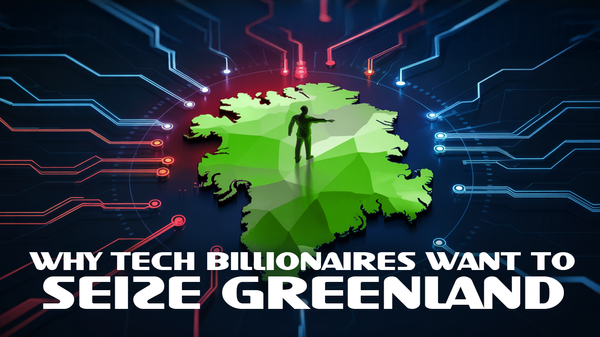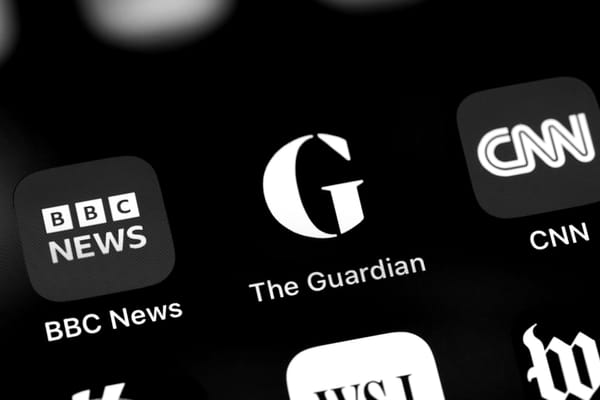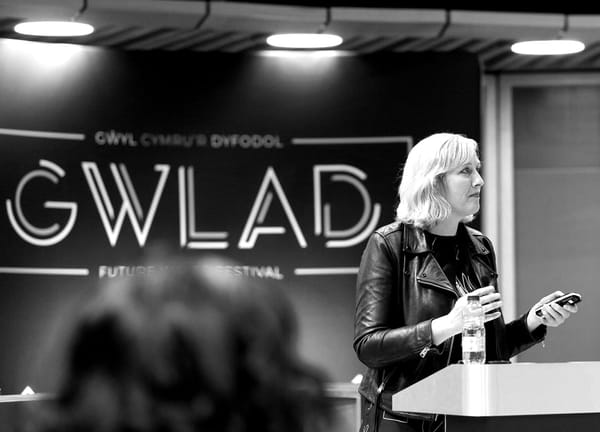Peter Thiel’s Apocalypse Dreams
A strange essay reveals how Silicon Valley elites are creating an apocalyptic techno-religion to rule the future of civilization

God is in His heaven
And we all want what’s His
But power and greed and corruptible seed
Seem to be all that there is
–Bob Dylan, “Blind Willie McTell”
In 2016, Barack Obama assured his staff that Donald Trump’s election victory was “not the apocalypse.” In 2025, Peter Thiel begs to differ. In a short essay published in the Financial Times on January 10, the tech billionaire countered Obama by arguing that the resurrection of Trump’s political career is, indeed, an apocalypse of sorts:
Trump’s return to the White House augurs the apokálypsis of the ancien regime’s secrets. The new administration’s revelations need not justify vengeance — reconstruction can go hand in hand with reconciliation. But for reconciliation to take place, there must first be truth.
Thiel’s baroque sermon – brimming with foreign words, conspiracy theories, and religious themes – cast Trump’s return to power as an “apokálypsis,” or “unveiling.” Judgment is coming! Who killed the Kennedys and Jeffrey Epstein? Was COVID-19 a conspiracy? Is truth a form of censorship against the holy revelation of disinformation? Is every institution in the United States of America just a sinful lie waiting to be exposed? Thiel seems positively giddy at the possibilities. When the Trumpet blows, the pillars shall crumble. Every knee will bend and every tongue will confess. Thiel even offers the possibility of forgiveness to those who purify themselves and convert to the new order.
A pope would blush at the shameless grandiloquence of this overexcited homily. Thiel ham-handedly tries to merge multiple narratives – economic, populist, technocratic, revolutionary – into an ecstatic argument for scary radicalism. He has made a conscious effort to swaddle himself in the language of religiosity in recent years, and his essay follows this pattern. Thiel frames the second coming of Trump as a story of apocalypse and judgment. The only thing missing is the Antichrist, that wicked and worldly figure who will arrogantly boast his greatness and "exalt and magnify himself above every god" while optimizing blasphemy and deception...
The peculiar op-ed is a confession dripping with self-important sophistication. Who in their right mind thinks this way, much less puts such a screed in print? Who is the audience for this messianic monologue? I have known certain kinds of street people to digress in this way, but Thiel is a billionaire deeply intertwined in our government. He clearly views himself as a brilliant political mind. Yet his florid approach bears the telltale hallmarks of intellectual forgery, and his politicized theology reads like something lashed together by ChatGPT from a paranoid list of cherry-picked citations. “The entire tone is reminiscent of a stranger sitting down next to you on public transit and whispering that the FBI is following him,” wrote Helen Lewis in The Atlantic.
Thiel is clearly intelligent, just not in the way he assumes. Worst of all, he clearly does not realize how delirious he seems. What is the PayPal Mafia godfather trying to say in his 959-word fire and brimstone End Times decree? The answer is obvious to those who understand the intersection between politics and religion.
Brothers and Sisters, please bow your heads in silent prayer. The time has come to open the Seventh Seal (or, if you prefer, Seal 7.0).
Thiel's revelation
Thiel has increasingly framed his ideas as religious, and we should take him at his word. What’s being unveiled here is a new kind of techno-religious movement. It’s a budding cult in which some of Silicon Valley’s wealthiest have positioned themselves as modern-day prophets. God is out, technology is in. Jesus may still be coming, but only in the form of Elon Musk or MessiahAI. Eternal life? There’s an app for that, along with a subscription model.
But don’t take it from me. Here’s an excerpt from a recent podcast interview with Bryan Johnson, a tech millionaire who publicly evangelizes the idea that he shall achieve immortality (and is clearly drinking the same Kool-Aid as Thiel):
We are creating God in the form of superintelligence. If you just say: What have we imagined God to be? What are its characteristics? We are building God in the form of technology. It will have the same characteristics. And so I think the irony is that the human storytelling got it exactly in the reverse, that we are the creators of God, and that we will create God in our own image.
Religion, Hierarchy, and the Software of Civilization
When I started writing about these politically extreme elements of tech, I understood why many others were hesitant to do so. It’s all so bizarre that it could easily be mistaken for a conspiracy theory.
But in 2025, the guy who claims he’s going to live forever and “create God” – a man who has injected the blood plasma of his own son into his own veins in a quest for eternal youth – is posing on X with Robert F. Kennedy Jr., Trump’s nominee for secretary of health and human services. Elon Musk is openly acting as a puppet master to the incoming president as he and his cronies draw up plans to rapture the federal bureaucracy. Meanwhile, Thiel is screeching about the apocalypse in the pages of serious newspapers.The political and psychological extremism of Silicon Valley has reached the White House. It can no longer be ignored.
Thiel makes it exceedingly clear that this movement should be viewed through the lens of religion, and we should oblige him. Only then can we understand its true aims. Here’s my take: This emerging tech cult admires religion for its rigid hierarchies. But unlike traditional conservative power structures where God sits atop the pyramid, these tech prophets place technology at the summit, with themselves as its high priests. Instead of divine authority flowing from God through patriarchal figures, authority flows from technology through its billionaire interpreters, who see themselves as humanity's saviors.
It’s a clever sleight of hand: by positioning technology as the ultimate authority, they position themselves – technology’s creators and controllers – as its earthly representatives. And by slowly melding their bodies with technology, they slouch toward some kind of high-tech transubstantiation in which they hope to rise above mortality and claim godlike powers.
As I have written before, this belief system maintains many elements of the conservative belief system that cognitive scientist George Lakoff calls “Strict Father Morality.” It includes familiar hierarchies: men above women, whites above other races, wealthy above poor, and employers above employees. But it adds new dimensions: the technologically enhanced above the unenhanced, the algorithmically optimized above the naturally evolved – and the trillionaires above the billionaires above the millionaires above everyone else.
The parallels with religious movements are too obvious to ignore. Where traditional faiths promise eternal life through spiritual salvation, this tech cult promises immortality through neural uploads, life extension, and the blood of literal sons. Where religions speak of ascending to heaven, Elon Musk preaches about humanity becoming “multi-planetary.” Where ancient faiths warned of demons and monsters, tech prophets warn of uncontrolled AI and biological threats. Where God sees all from on high, the all-knowing eye of technology sees all from networked machines.
The language is tweaked, but the underlying structure remains remarkably consistent. Our would-be tech overlords have in mind a new order and hierarchy for human civilization, one created in their own image. To make it permanent, however, they must make it religious, because religion is a key software of civilization. Their new belief system must last thousands of years and erase all that came before it. It must overthrow the established order, with its sentimental attachments to reality and its analog currency engraved with “In God We Trust.” It must inspire humankind to abandon Creation itself – the Earth – for dead planets and the cold unknown. It must create a Catholicism without Christ and a Zionism without Israel. (See: Network State.)
“Technology is the glory of human ambition and achievement, the spearhead of progress, and the realization of our potential,” wrote Thiel associate Marc Andreessen in his 2023 “Techno-Optimist Manifesto,” which was written in the style of Biblical prophetic texts and concluded with a list of new tech “saints.” “For hundreds of years, we properly glorified this – until recently. I am here to bring the good news.”
But the tech gurus haven't ironed out all the kinks. There exist many internal contradictions and points of tension in their gospel. For example, they align with conservatives in sneering at the idea of gender transitions, yet they embrace transhumanism and seek to radically transform human nature through technological means. They don’t just want to preserve traditional hierarchies. They want to encode these hierarchies permanently into the architecture of future civilization – stamped into our code, our genes, and our future.
In 2025, this tech priesthood has entered into a makeshift alliance with MAGA Republicans. While they may share an interest in hierarchical power structures, they differ in their ultimate source of authority: Technology versus God. This distinction is a crucial fault line, and it may lead to trouble on the information superhighway to Techno Damascus.
Laying waste to the old order
In the meantime, as Thiel gleefully anticipates, it’s time for these ersatz allies to lay waste to the old order. His essay provides clues as to how this will be achieved. It starts with convincing Americans that their government is a false prophet and a golden calf undeserving of reverence. It, therefore, follows that almost everything they have been taught to believe in is a lie. What better way to convince Americans of the corruption of their sacred government – for which generations bled and died – than to have that very government become the destroyer of their faith?
But it’s not enough to overturn truth and destroy existing faiths. New systems must arise to replace them.
From Thiel’s essay:
The future demands fresh and strange ideas. New ideas might have saved the old regime, which barely acknowledged, let alone answered, our deepest questions...
Perhaps an exceptional country could have continued to ignore such questions, but as Trump understood in 2016, America is not an exceptional country. It is no longer even a great one.
So much for God and country...let us raise our mugs of lukewarm plasma in a toast the algorithm.
Prophets of tech dystopia
I cannot believe these guys keep saying these things out loud, but they seem convinced that they have already won. Thus, like the villains in some classic cartoons, they look straight at the camera and admit everything.
Thiel’s true apokálypsis isn’t about exposing hidden truths or government secrets. It’s about the emergence of this new power structure that combines the authoritarian tendencies of traditional hierarchies with dystopian tech sophistry. Thiel and his fellow tech profits – err, “prophets” – see themselves as the architects of a new belief system that aims to reshape civilization. Their apocalypse isn’t about the end of the world. It’s about the end of one social order and the beginning of another – one justified by technological might rather than divine right.
So, the apocalypse is nigh – yet again. How disappointing. While claiming to be an agent of the future, Thiel rehashes religious concepts that have existed for millennia. For most of history, humankind has waited on the apocalypse. There’s another Greek word for this, eschatology, and it's an entire field of academic study. Thiel adds nothing new except for the apparent conviction that he and his friends are the Alpha and the Omega. Even The Jetsons, the space-age cartoon from the 1950s, had a more seductive vision of the future than this dark fantasy Thiel keeps unfurling.
Pursuit of the Millennium
Twenty years ago, I read a fantastic book by Cambridge scholar Norman Cohn, The Pursuit of the Millennium: Revolutionary Millenarians and Mystical Anarchists of the Middle Ages. Cohn surveyed the history of apocalyptic movements in Western culture and categorized their elements:
Beneath the pseudo-scientific terminology one can in each case recognize a phantasy of which almost every element is to be found in phantasies which were already current in medieval Europe. The final, decisive battle of the Elect (be they the ‘Aryan race’ or the ‘proletariat’) against the hosts of evil (be they the Jews or the ‘bourgeoisie’); a dispensation on which the Elect are to be most amply compensated for all their sufferings by the joys of total domination or of total community or of both together; a world purified of all evil and in which history is to find its consummation - these ancient imaginings are with us still.
Spoiler Alert: The apocalypse never arrives, but it doesn’t need to. Apocalyptic cults use the spectre of Armageddon to create powerful movements – economic, political, and religious – that sometimes change the course of history. The apocalypse narrative is simply the catalyst for action. The real threat comes from the new religion built in its wake, and this is the ring of power Thiel appears to openly covet as we enter 2025.
Trump revealed that the cult remains a powerful weapon in 21st-century politics, but he is 78 years old. What comes next? That is the problem Thiel and his brethren must solve. It won’t be easy – especially if Thiel and Co. keep indulging in these public reveries.
No one has yet defeated our prevailing ideas of God, and few people look at a tech bro and see a messiah. If forced into Holy War, most people – Blue America and Red America alike – will likely choose the gods of their forebears over the megalomaniacal glossolalia of these weird tech elites. I never made it as far as Holy Communion and I haven't been to Mass in years. And yet – Hineni! Hallelujah! – let me be among the first to say: Yea though I walk through the Valley of the Shadow of the Silicon, I shall fear no Evil...
This newsletter is supported by the generous contributions of 38 paid subscribers. Click here to join them!





